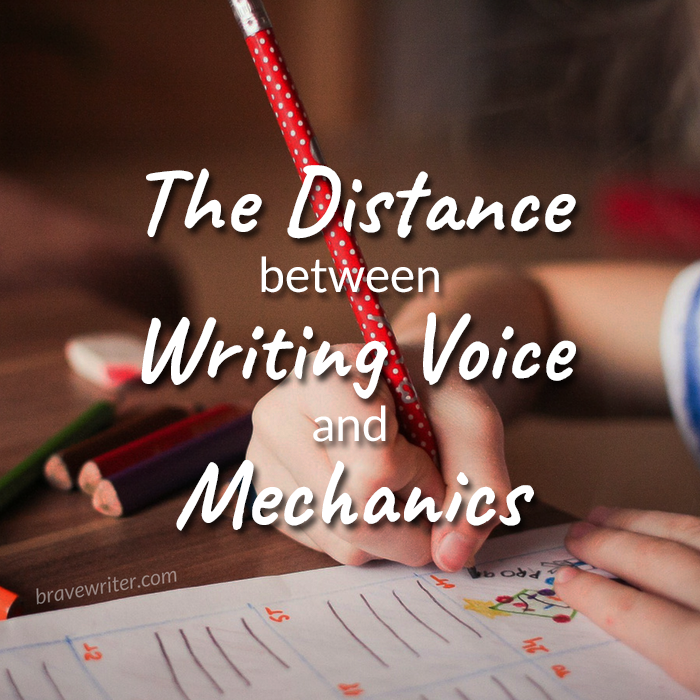The Distance Between Writing Voice and Mechanics

I’ve had a lot of emails and phone calls expressing anxiety about writing. Nothing unusual about that in my in-box. But the concerns overlapped in the type of anxiety they expressed. Moms new to Brave Writer find it really hard to believe that it is possible to nurture your child’s writing voice without worrying about the mechanics of writing. They wonder if they are fostering a carelessness in their children’s writing habits. Shouldn’t they learn to care about how they spell, how they punctuate, how they construct their sentences and paragraphs? Isn’t attentiveness to the form as important as attentiveness to the content?
[This post contains Amazon affiliate links. When you click on those links to make purchases,
Brave Writer receives compensation at no extra cost to you. Thank you!]
It’s true that meticulous care about mechanics is a final step in every writing process. When students in high school turn in papers to me, I always tell them that they can make sure it is error free. They have spell-check, parents, friends – all who can lend support to finding spelling errors, missed punctuation and typos. The presentation of the final paper is a psychologically important part of grading a paper, in fact. A teacher, parent or professor is put at ease when the writing is without error. The mechanical perfection of the paper renders the form invisible and frees the reader to focus exclusively on content. What a joy that is!
So yes, mechanics matter a lot in writing and there’s nothing at all wrong with expecting a high standard in the final product. Far be it from me to ever have associated with my name a carelessness about how the final paper is presented!
On the other hand, there is a peculiar challenge in writing. To find one’s meaning, to explore and excavate one’s ideas requires a letting go of the wheel.
It’s hard to focus on the end marks and spellings when your inner eye is trained on an idea and where it is going. For your kids, who are even less skilled as writers, it’s even harder for them to pat their stomachs and rub their heads simultaneously. They haven’t got years of writing and reading under their belts. The conventions of punctuation aren’t automatic for them. To write “correctly” requires effort and attentiveness.
If they focus on how to put it on paper,
they lose touch with what they want to say.
The quickest way to kill a writer’s inspiration is to ask him or her to think about how to write before the writer has thought about what to write. Start with their:
- ideas,
- images,
- thoughts,
- fantasies.
Later, once all that mess is out there, it’s possible to shift gears and give full attention to editing. In fact, it’s surprisingly satisfying to clean up the mess of creativity once it is on paper. Editing is relaxing in the way that mowing the lawn or ironing a wrinkled shirt is. You see progress instantly!
So save mechanics and instruction in how to execute them for copywork, dictation, and other people’s writing (our Arrow and Boomerang language arts programs are great for this).
And for those who like more structure, we suggest using a dedicated program only once in elementary school (something like Nitty-Gritty Grammar), once in junior high (Winston Grammar), and a foreign language in high school.
In the meantime, while you are growing a young writer, give full attention to what that writer wants to say and how he or she wants to say it. Mess with meanings, play with words, wriggle around in disorder and creativity. Then, once the words are all over the page in their glorious chaotic sense, impose a little order by editing for spelling, punctuation and grammar.
That’s the best (and I daresay, only) way to cultivate writing voice while giving some attention to the mechanics of writing.
Tags: Mechanics



















As I gradually ‘get’ the Bravewriter lifestyle more and more, I am really seeing how this works. It is relaxing for me too, to only have to think about one thing at a time, content when they are freewriting (whether their own spontaneous writing or something I have suggested) and neatness, in all senses, with copywriting or final editing. I am begining to ‘get’ this too as I tentatively explore my own writing abilities.
As always, Thanks,
Gaynor